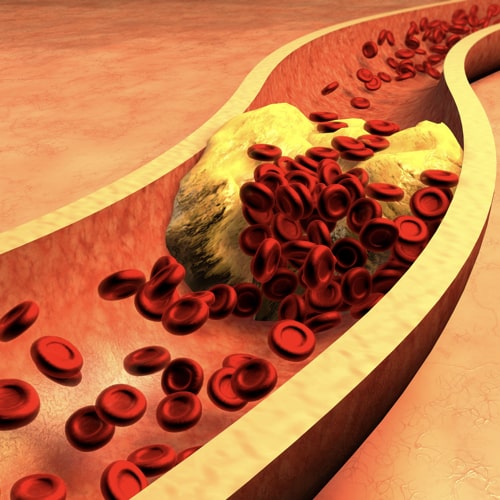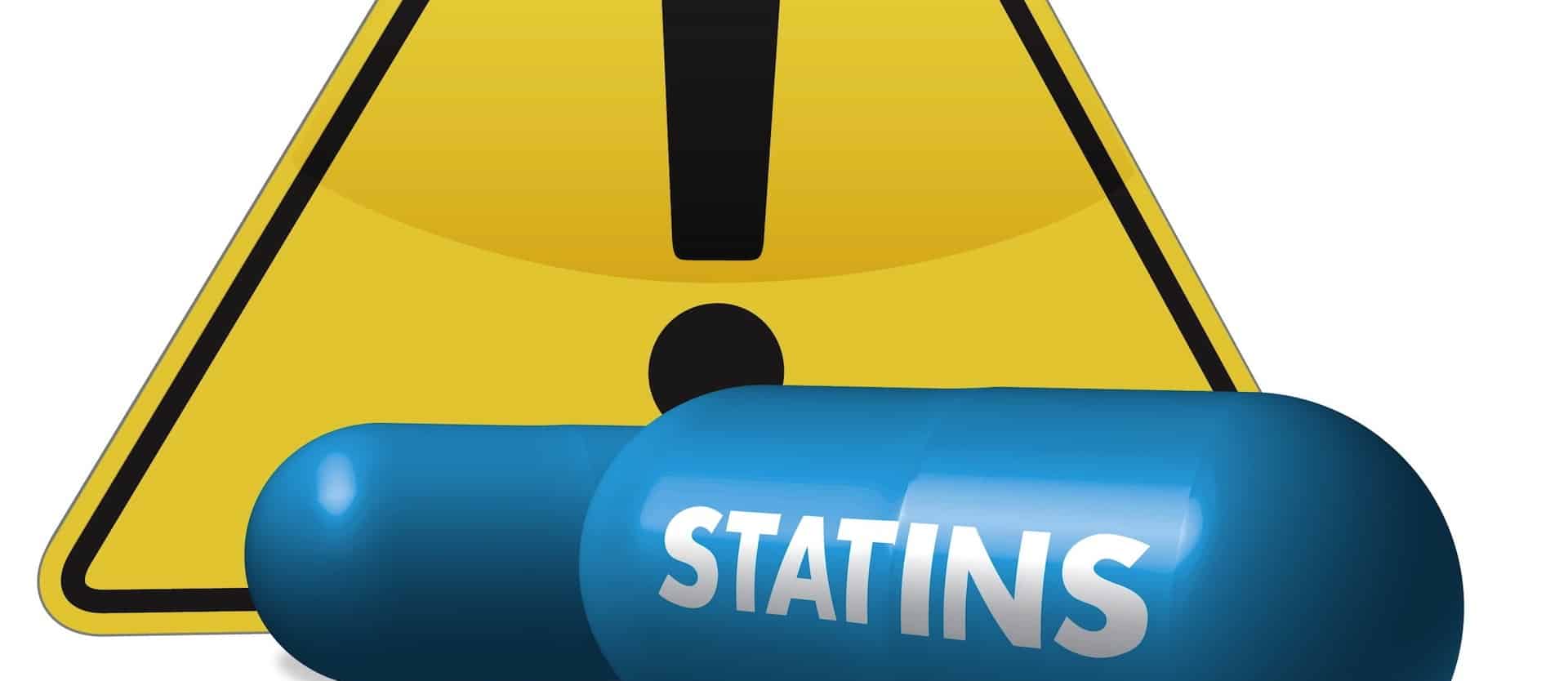
Statins
The cholesterol-lowering statin drug Lipitor has become the best-selling drug of all time. This class of drugs garnered so much enthusiasm in the medical community that some U.S. health authorities reportedly advocated for statins to be added to the public water supply like fluoride is. One cardiology journal even offered the tongue-in-cheek suggestion for fast-food restaurants to offer “McStatin” condiments along with ketchup packets to help neutralize the effects of unhealthy dietary choices.
For those at high risk for heart disease who are unwilling or unable to bring down their cholesterol levels naturally with dietary changes, the benefits of statins generally outweigh the risks. These drugs do have side effects, though, such as the potential for liver or muscle damage. The reason some doctors routinely order regular blood tests for patients on these drugs is to monitor for liver toxicity. We can also test the blood for the presence of muscle breakdown products, but biopsies reveal that people on statins can show evidence of muscle damage even if their blood work is normal and they exhibit no symptoms of muscle soreness or weakness. The decline in muscular strength and performance sometimes associated with these drugs can place our seniors at increased risk for falls and injury.
More recently, other concerns have been raised, including the potential for brain-related side effects, such as memory loss and confusion. Statin drugs also appear to increase the risk of developing diabetes.
Why accept any risk at all if you can lower your cholesterol naturally? Plant-based diets have been shown to lower cholesterol just as effectively as first-line statin drugs, but without the risks. In fact, the “side effects” of healthy eating tend to be good—less cancer and diabetes risk and protection of the liver and brain.
For substantiation of any statements of fact from the peer-reviewed medical literature, please see the associated videos below.
Popular Videos for Statins

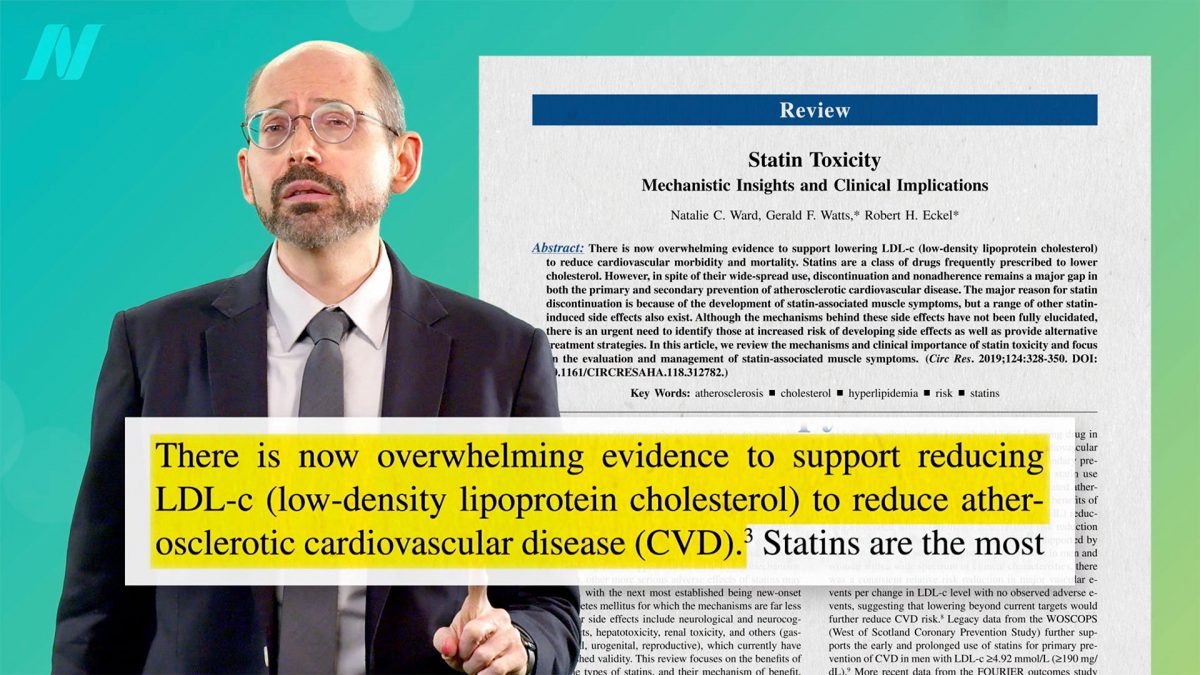
How Common Are Muscle Side Effects from Statins?
Why is the incidence of side effects from statins so low in clinical trials but...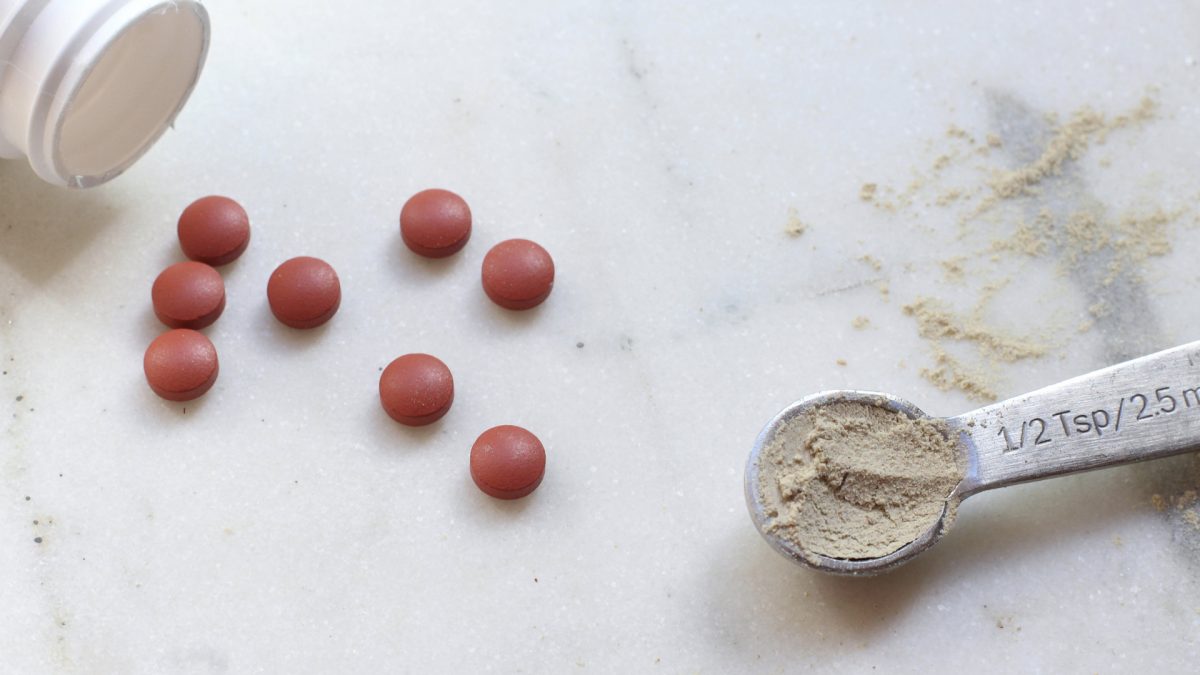
Amla vs. Drugs for Cholesterol, Inflammation, and Blood-Thinning
Extracts of amla (Indian gooseberry) were pitted head-to-head against cholesterol-lowering statin drugs and the blood...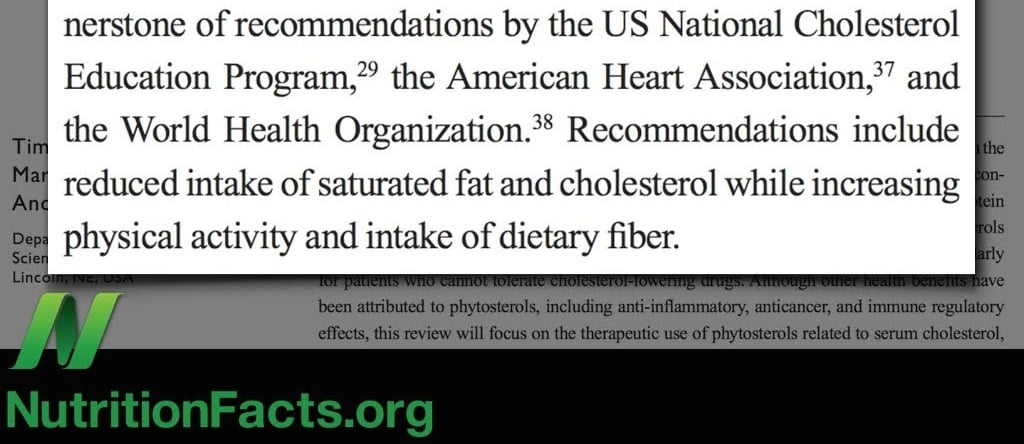
Diet Versus Drugs for High Cholesterol
Though official recommendations are to first treat high cholesterol with dietary change, many physicians jump...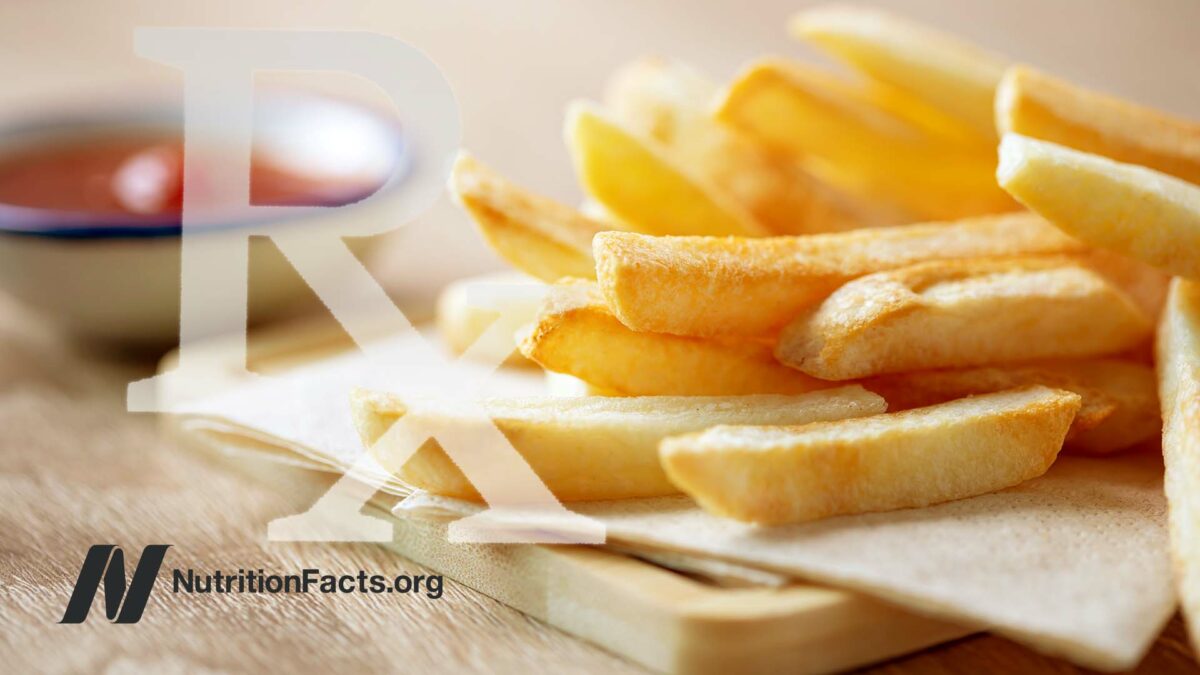
Fast Food: Do You Want Fries with That Lipitor?
Cardiologists suggest that cholesterol-lowering statin drugs be given out free with fast food mealsAll Videos for Statins
-

Risks and Benefits of Nicotinic Acid (NA), a NAD+ Booster
Given niacin’s decades of use as a cholesterol drug, we have a good idea of its safety profile.
-

The Best Way to Boost NAD+: Supplements vs. Diet (webinar recording)
The pros and cons of all the NAD+ supplements and what are the ways to boost NAD+ naturally with diet and lifestyle?
-

The Diet Shown to Slow Age-Related Hearing Loss
An interventional trial found that dietary changes may slow or even reverse the loss of hearing.
-

How to Boost FGF21 with Diet for Longevity
Fasting and exercise can boost the longevity hormone FGF21, but what can we eat—or avoid eating—to get similar effects?
-

Are PCSK9 Inhibitors for LDL Cholesterol Safe and Effective?
Those with genetic mutations that leave them with an LDL cholesterol of 30 live exceptionally long lives. Can we duplicate that effect with drugs?
-

How Low Should You Go for Ideal Cholesterol Levels?
Having a so-called normal cholesterol in a society where it’s normal to drop dead of a heart attack isn’t necessarily a good thing.
-

How Much Longer Do You Live on Statins?
What are the pros and cons of relative risk versus absolute risk versus number-needed-to-treat versus average postponement of death taking cholesterol-lowering statin drugs?
-

The True Benefits vs. Side Effects of Statins
A Mayo Clinic visualization tool can help you decide if cholesterol-lowering statin drugs are right for you.
-

Are Doctors Misleading Patients About Statin Risks and Benefits?
What is the dirty little secret of drugs for lifestyle diseases? If patients knew the truth of how little these drugs actually worked, almost no one would agree to take them.
-

Who Should Take Statins?
How can you calculate your own personal heart disease risk and use it to determine if you should start on a cholesterol-lowering statin drug?
-

How Common Are Muscle Side Effects from Statins?
Why is the incidence of side effects from statins so low in clinical trials but appear to be so high out in the real world?
-

Oxidized Cholesterol 27HC May Explain 3 Breast Cancer Mysteries
Oxidized cholesterol (concentrated in products containing eggs, processed meat, and parmesan cheese) has cancer-fueling estrogenic effects on human breast cancer.
-

Does an Apple a Day Really Keep the Doctor Away?
Which would save more lives: eating an apple a day or taking statin drugs?
-

Amla vs. Drugs for Cholesterol, Inflammation, and Blood-Thinning
Extracts of amla (Indian gooseberry) were pitted head-to-head against cholesterol-lowering statin drugs and the blood thinners aspirin and Plavix.
-

The Best Food for High Cholesterol
Are the apparently amazing benefits of amla—dried Indian gooseberries—too good to be true?
-

Should All Children Have Their Cholesterol Checked?
The current generation of American kids may be one of the first generations to be less healthy and have shorter lifespans than their parents.
-

How Not to Die: An Animated Summary
We have tremendous power over our health destiny and longevity.
-

Lose Two Pounds in One Sitting: Taking the Mioscenic Route
Our physiology evolved for millions of years eating a plant-based diet. What would happen if researchers tried to recreate our ancestral diet in the lab?
-

How to Regenerate Coenzyme Q10 (CoQ10) Naturally
Chlorophyll in our bloodstream after eating greens may react with wavelengths of sunlight that penetrate through our skin to reactivate the antioxidant Coenzyme Q10 (ubiquinol).
-

Treating Chronic Kidney Disease with Food
Plant-based diets have been shown to slow or stop the progression of kidney failure, but what about all the phosphorus and potassium in plant foods?
-

Cholesterol and Alzheimer’s Disease
High-tech advances, such as PET scanning, offer new insight into the role cholesterol plays in both the amyloid cascade and vascular models of the development of Alzheimer’s dementia.
-

Can Oatmeal Reverse Heart Disease?
Less than 3% of Americans meet the daily recommended fiber intake, despite research suggesting high-fiber foods such as whole grains can affect the progression of coronary heart disease.
-

Drugs & the Demise of the Rice Diet
What is the contemporary relevance of Dr. Kempner’s rice and fruit protocol for the reversal of chronic disease?
-

Optimal Cholesterol Level
Why don’t authorities advocate a sufficient reduction in cholesterol down to safe levels?
-

Why Prevention Is Worth a Ton of Cure
More people might be open to changing their diet and lifestyle if they knew how little modern medicine has to offer for combating chronic diseases.
-

The Actual Benefit of Diet vs. Drugs
The medical profession oversells the benefits of drugs for chronic disease since so few patients would apparently take them if doctors divulged the truth.
-

Flaxseeds for Hypertension
Extraordinary results reported in a rare example of a double-blinded, placebo-controlled, randomized trial of a dietary intervention (flaxseeds) to combat one of our leading killers, high blood pressure.
-

Eliminating 90% of Heart Disease Risk
Preventing and treating chronic diseases such as heart disease, diabetes, and stroke with diet and lifestyle changes is not just safer but may be dramatically more effective
-

Dairy Estrogen and Male Fertility
Sex steroid hormones in meat, eggs, and dairy may help explain the link between saturated fat intake and declining sperm counts.
-

Four Nuts Once a Month
A single serving of Brazil nuts may bring cholesterol levels down faster than statin drugs and keep them down even a month after that single ingestion.
-

Barriers to Heart Disease Prevention
According to the Director of the famous Framingham Heart Study, the best way to manage cholesterol and heart disease risk is with a more plant-based diet. Why then, don’t more doctors advise their patients to change their diets?
-

Beans, Beans, They’re Good for Your Heart
Legumes such as lentils, chickpeas, beans and split peas may reduce cholesterol so much that consumers may be able to get off their cholesterol-lowering statin drugs, but to profoundly alter heart disease risk we may have to more profoundly alter our diet.
-

Statin Cholesterol Drugs and Invasive Breast Cancer
Reducing cholesterol levels may inhibit breast cancer development, but the long-term use of cholesterol-lowering statin drugs is associated with more than double the risk of both types of breast cancer: invasive ductal carcinoma and invasive lobular carcinoma.
-

Fully Consensual Heart Disease Treatment
When doctors withhold dietary treatment options from cardiac patients, they are violating the cornerstone of medical ethics, informed consent.
-

Tell Your Doctor if You Eat Grapefruit
The role white and pink (red) grapefruit may play in weight loss and cholesterol control, as well as the suppression of drug-clearance enzymes within the body.
-

Diet Versus Drugs for High Cholesterol
Though official recommendations are to first treat high cholesterol with dietary change, many physicians jump right to cholesterol-lowering medications, such as statins, that can have an array of adverse side effects.
-

Power Plants
Many of the most powerful drugs in modern medicine’s arsenal came from natural products, from penicillin to the chemotherapy agents Taxol® and vincristine.
-

Trans Fat, Saturated Fat, & Cholesterol: Tolerable Upper Intake of Zero
The intake of trans fats, which come mostly from junk food and animal products; saturated fat, mostly from dairy products and chicken; and cholesterol, coming mostly from eggs and chicken, should be as low as possible.
-

Fast Food: Do You Want Fries with That Lipitor?
Cardiologists suggest that cholesterol-lowering statin drugs be given out free with fast food meals
-

Heart Attacks and Cholesterol: Purely a Question of Diet
To achieve the cholesterol level necessary to prevent heart attacks, most people must take cholesterol-lowering drugs—or eat a plant-based diet.
